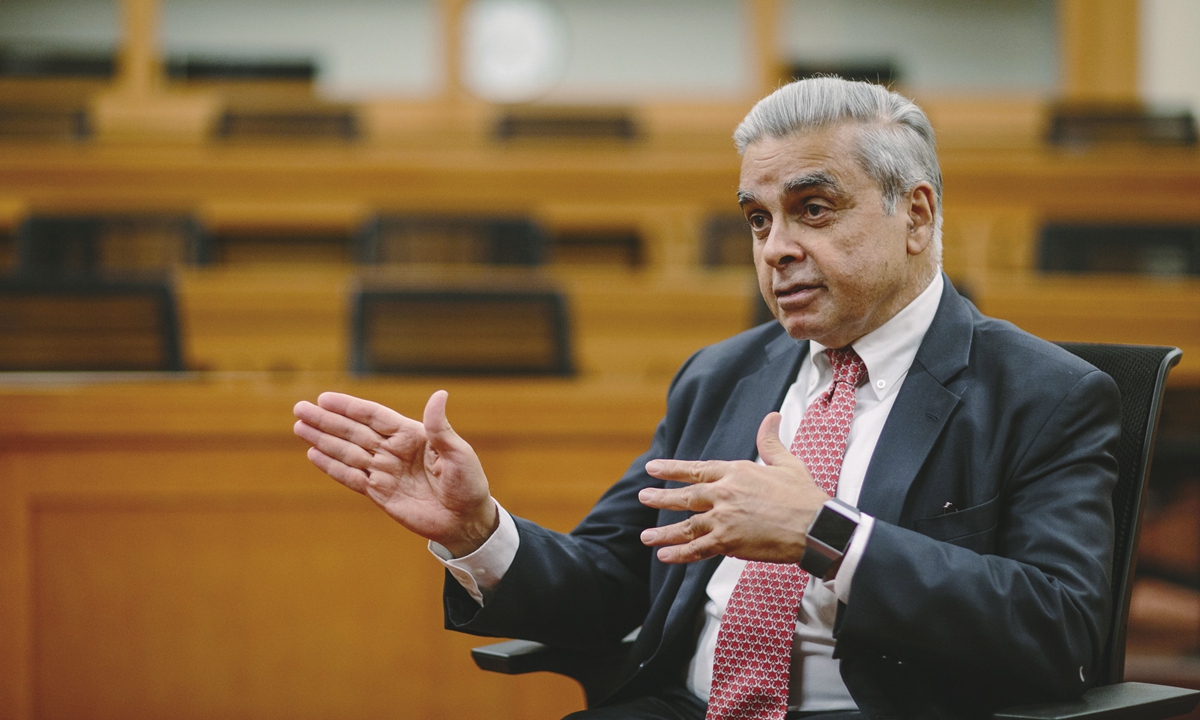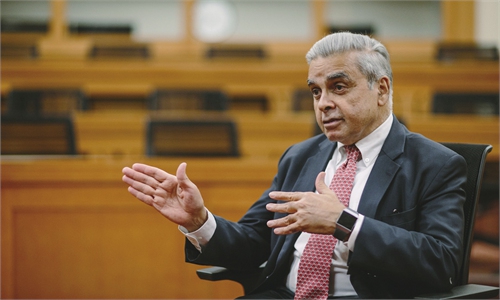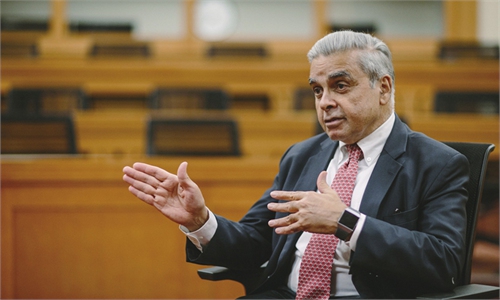
Kishore Mahbubani Photo: Li Hao/GT
Editor's Note:What is the Biden administration's China policy? Kishore Mahbubani (Mahbubani), Singaporean political scientist and distinguished fellow at the Asia Research Institute, National University of Singapore, believes the Biden administration has still not finalized its China strategy. But as an improvement over the Trump administration's policies, it "would like to renew some of the engagement policies of the previous Obama administration toward China." How should we understand the recent interactions between China and the US? How will the bilateral relations evolve? Mahbubani shared his insights in a written interview with Global Times (GT) reporters Yu Jincui and Bai Yunyi. The interview begins with his book Has China won? - China's Choice, whose simplified Chinese edition was just published by CITIC (China International Trust Investment Corporation) Press Group in September 2021.
GT: In your book Has China won?, you said that America made a great strategic mistake to launch its geopolitical contest with China without having a comprehensive long-term strategy on how to deal with a country like China. Why did you say so? Based on your observations, is the US deepening its mistake under Biden or rectifying it?
Mahbubani: The man who alerted me that the US doesn't have a comprehensive long-term strategy is Dr Henry Kissinger. When I was researching my book, Has China Won?, I met him in New York in March 2018. He is America's greatest living strategic thinker. He allowed me to cite him saying that the US doesn't have a strategy.
The lack of strategy is also demonstrated by the lack of clear strategic goals. What is the US trying to accomplish by launching this contest against China? Stop China's economy from becoming No.1? Isolate or contain China? Overthrow the CPC? As you can tell from the listing of such goals, it is clear that none of these goals are achievable. No US leader has ever spelt out what goals the US is trying to accomplish by launching this contest. This also confirms the lack of strategy.
The Biden administration has still not finalized its China strategy. It is still in a learning phase and it will take some time before the Biden administration crystallizes and confirms its policies toward China.
In the policies of the Biden administration toward China, there have been positive and negative developments. On the positive side, the Biden administration has categorically reiterated its commitments to the One China policy. This has been stated several times by senior Biden administration officials, including President Biden, Vice President Kamala Harris and Secretary of Defense Lloyd Austin. On the negative side, the Biden administration is incapable of removing any of the trade tariffs and sanctions that the Trump administration had put in place against China. My own assessment is that the Biden administration would like to renew some of the engagement policies of the previous Obama administration toward China.
GT: You believe there is no so-called China threat. China has no intention to export ideology, and China maintains calmness and restricts the use of military force. But why can't the West believe this? Can they overcome their misjudgments and misunderstandings?
Mahbubani: The West is divided on China. The US' political establishment is united in believing that China is a threat to the US (although the nature of the threat has never been defined). By contrast, most European countries do not regard China as a direct threat to Europe. Hence, the US and Europe have not achieved a unified strategy toward China.
Nonetheless, it is also clear that both the US and Europe are deeply troubled by the reemergence of China. The West (including both the US and Europe) have dominated world history for 200 years. Hence they find it difficult to give up their domination of the world. Here is one concrete example. The Europeans insist that a European must run the IMF. The Americans insist that an American must run the World Bank. This is a clear example of their refusal to accept the reality that the period of Western domination of world history is ending.
GT: The Chinese and the US leaders held their second phone conversation recently. Nonetheless, the US just formed a new security partnership with the UK and Australia and hosted an in-person Quad summit, both of which have an apparent target: China. How do you evaluate the China policy adopted by Biden? Does it have consistency? Who dominates the China policy in the Biden administration?
Mahbubani: The Biden administration has still not finalized its strategy toward China. Nonetheless, the policies of the Biden administration toward China are an improvement over the Trump Administration's policies.
First, the Biden administration has categorically reiterated its commitment to the One China policy, whereas the Trump administration was undermining it. Second, the Biden administration officials are, on balance, more polite toward China and do not give rude and insulting speeches on China in a way that former vice president Mike Pence and former secretary of state Mike Pompeo did.
Clearly, there are different schools of thought within the Biden Administration. One school of thought believes that the Biden administration should carry on with many of the confrontational policies of the Trump administration toward China. This is why the trade tariffs on China have not been lifted. However, there is another school of thought that believes that the Biden administration should carry on with some of the engagement policies of the Obama Administration. Fortunately, a new study has been released by the National Committee on American Foreign Policy and the American Friends Service Committee (AFSC). It showed that the Obama Administration's Strategic and Economic Dialogue with China from 2009 to 2016 resulted in real benefits in areas such as climate change, public health, and security. One clear conclusion of that study is that engagement works.
In theory, the policies of the Biden administration toward China should be the result of long-term strategic thinking. Unfortunately, the Biden administration is also constrained by short-term political considerations. The main goal of the Biden administration is to avoid losing the House and the Senate in the November 2022 midterm elections. Hence, the Biden administration cannot be seen to be soft on China. If it is seen to be soft on China, the Republicans will attack it and use it to gain votes at the November 2022 midterm elections.
GT: Qin Gang, the new Chinese Ambassador to the US, has been very active after arriving in Washington. He met political figures like Henry Kissinger and some business leaders, and is busy attending conversations held by the US think tanks. What messages do you think China is conveying through Qin Gang's activities in the US?
Mahbubani: I have not had the pleasure of meeting China's new ambassador to the US, Qin Gang. I was good friends with China's previous ambassador to the US, Cui Tiankai. It is good that Qin Gang is reaching out to meet Henry Kissinger and members of the business sectors in the US. This is what diplomacy is all about. As a diplomat for 33 years, I know that there is no substitute for good face-to-face conversations. Since President Joe Biden and President Xi Jinping have met several times before, it will be good for them to meet face-to-face as soon as possible.
GT: From your perspective, what does Meng Wanzhou's release mean for the China-US relations? Is it a positive sign for the bilateral relations, or are the tensions between China and the US likely to continue or even escalate?
Mahbubani: The release of Meng Wanzhou was a very positive development for US-China relations. Her continued detention would have reminded the Chinese people of the "Century of Humiliation" when Chinese nationals were subject to Western laws in an extraterritorial fashion. The key point to note here is that the laws that the US were trying to impose on Meng Wanzhou were extraterritorial laws that the US had created on Iran. Even European banks had to pay huge fines, even though they had broken no European laws. Therefore, her release was definitely a positive sign. However, the underlying tensions between China and the US will not dissipate soon, for reasons I document in my book, China's Choice.
It's important to emphasize here that when the US decided to launch its geopolitical contest against China, this move was driven by deep structural forces, not by personalities, like former president Donald Trump. As I document in China's Choice, the first structural force is the reluctance of any No.1 power in the world to cede its No.1 position to the No.2 power in the world. Many in the US know that, on the basis of current trends, China's economy will become bigger than that of the US within 10-15 years. Hence, the US is taking actions to ensure that this does not happen. It is significant that President Biden said in March 2021, "China has an overall goal to become the leading country in the world, the wealthiest country in the world, and the most powerful country in the world… That's not going to happen on my watch." This statement reflects clearly America's desire to remain the No.1 in the world.
Second, there has always been a fear in the Western psyche of the "yellow peril." It is politically incorrect to openly discuss this "yellow peril" dimension in the West. One aim of my book is to promote a rational and objective discussion of the emotional force of the "yellow peril" dimension in the Western psyche.
Third, many in the US expected China's political system to become like America's. Mr. Kurt Campbell, in his article for Foreign Affairs magazine, said that "the assumption that deepening commercial, diplomatic, and cultural ties would transform China's internal development and external behavior has been a bedrock of US strategy. Even those in US policy circles who were skeptical of China's intentions still shared the underlying belief that US power and hegemony could readily mold China to the US' liking... The policies built on such expectations have failed to change China in the ways we intended or hoped." This explains the bipartisan consensus against China in the US.
GT: Some Western analysts, or China watchers, argue that Meng's case shows that China's "hostage diplomacy" worked. What's your take on this?
Mahbubani: The simultaneous release of the two Canadian citizens, Michael Kovrig and Michael Spavor, was a positive development. Clearly, the detentions of Meng Wanzhou, Michael Kovrig and Michael Spavor had become a major sour point in relations between China and the US, and between China and Canada.
GT: After Meng's release, what's the next sector in which some movements or progress that can be expected to transpire between China and the US?
Mahbubani: The next sector in which some movements and progress can be expected between the China and the US is in the area of sanctions and tariffs that the two countries have applied on each other. During his election campaign, President Joe Biden had said, regarding the Trump administration's trade tariffs on China, "President Trump may think he's being tough on China. All that he's delivered as a consequence of that is American farmers, manufacturers and consumers losing and paying more." It would therefore be very helpful if both US and China, on a reciprocal basis, agree to remove the trade sanctions and tariffs that they have imposed on each other. It would be a huge step forward if this could be done, as this would benefit both the economies of the US and China.
GT: In your opinion, how might the recently announced AUKUS security pact reshape the landscape of the Asian-Pacific region, and what does it mean for China? How do you see the chance of a conflict evolve in the region?
Mahbubani: The US, the UK and Australia have a sovereign right to form their own security pacts. Hence, we cannot challenge their right to establish such a security pact. However, history has shown us that the UK has withdrawn twice from East Asia. First, it did not defend Singapore when the Japanese invaded Singapore in 1942. It basically abandoned the British naval base in Singapore in 1968 when it announced it would pull out by 1971, even though it had given assurances to the Singapore government that it would stay until the mid-1970s. Given the enormous domestic preoccupations of the UK, it is unlikely to play a major strategic role in East Asia. Hence, it is unlikely that AUKUS will last very long.
GT: Many ASEAN members such as Malaysia and Indonesia expressed concerns about the AUKUS deal. How will the deal affect ASEAN members? Will countries in the region be divided and forced to take sides?
Mahbubani: Malaysia and Indonesia have expressed legitimate concerns about the AUKUS deal. It raises fundamental concerns about whether or not this violates the nonproliferation regime. The best way to answer this question is to ask whether the AUKUS countries would object to Iran acquiring nuclear submarines. If Iran acquiring nuclear submarines is against the nonproliferation regime, does this mean all other countries should also not acquire nuclear submarines?
The ASEAN countries believe in an inclusive approach. It would therefore be wiser to allow ASEAN to take the lead in creating a regional architecture. I have explained at great length in my book, The ASEAN Miracle, which has also been published in China by Beijing University Press [in 2017], how ASEAN has done an amazing job of creating peace and stability in East Asia.
GT: How do you interpret China's recent move to apply for the membership in the CPTPP? Some analysts believe it's a way to counter the American submarine deal with Australia. What's your take?
Mahbubani: China's recent move to apply for the membership in the CPTPP is a hugely positive development. I do not believe that this is purely a development to counter the US' moves with Australia. This application to join the CPTPP reflects the long-term strategic thinking of China. China has believed that economic development with East Asia will lead to peace in East Asia. Hence, I hope China will succeed in its application to join the CPTPP.


